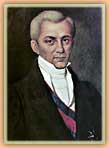 |

As it appeared from the first weeks that followed the appointment of Kapodistrias, his main objective was the creation of a powerful state mechanism. The organization of an effective administration would assist the recovery of the economy which had been weakened by the long wars. Taxation and external loans were to be handled rationally and were not to be used for the attraction of political allies from the dominating political factions. At the same time, a centralized and powerful executive power would promulgate more effectively the claims of the Greek side in both the question of frontiers and the form (independence rather than autonomy) of the future Greek state.
In order to accomplish these, Kapodistrias claimed and succeeded in gathering the executive and legislative power into his own hands. He also kept apart from, at least in the beginning, the different factions, the political antagonism of which had disorganized the institutions and functions of the central administration. The reforms he attempted in the organization and function of the regional administration was the first systematic intervention in the direction of the creation of a modern state. His primary concern was the abolition of regional autonomy from which
the traditional but also the newly established political groups of Greek society drew their economic power and socio-political force.
The number of administrative districts was reduced whereas the organs of regional administration and the persons that staffed them were subjected to the control of the central power. These measures, which led to a rupture between Kapodistrias and the local social elites of Greek society, were fundamentally similar to those adopted by the regency and Otto a few years later.
An indispensable condition for the establishment of a modern state
was the formation of an army controlled by the administration.
The regrouping of the irregular troops of the Revolution into semi-regular formations advanced despite opposition. This came mainly from the chieftains who had seen their economic and political power increase in the years of the Revolution. The armed forces were organized into units of a thousand men and were later reformed into the Light Battalions.
In both phases the number of the troops was limited considerably (by approximately one quarter) and many eminent chieftains were discharged. In the economy, the non-granting of an external loan was an obstacle. Thus, the recovery of the economy was not achieved as impoverished domestic resources could not support the ambitious programme of Kapodistrias. However, the fight against piracy had significant results. This freed the sea routes and made possible the reactivation of trade and navigation.
|
 |